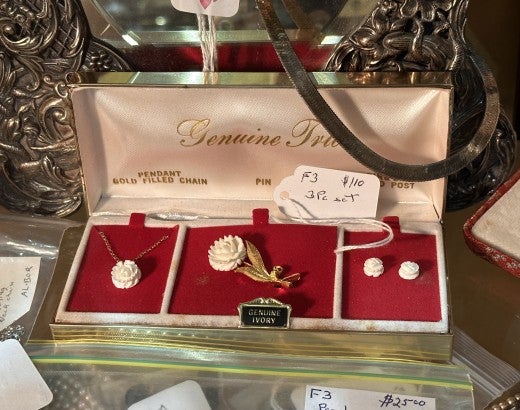An undercover investigation from the Humane Society of the United States and Humane Society International has unearthed a thriving market for elephant ivory products in Massachusetts, as lawmakers there consider a bill that would ban the ivory trade within the state.
Our investigators visited the New Bedford Whaling Museum’s Annual Nautical Antiques Show in May, where they found sellers from both within and outside Massachusetts peddling ivory objects, including figurines, walking canes, dollhouse furniture, tools and food canisters.
When our investigator asked sellers if they had anything that verifies the age and origin of the items, many said they did not. This is concerning because federal law prohibits interstate trade in ivory items from recently poached elephants and without documentation it is impossible to tell if the ivory was brought into the United States legally.
In 2016, the Obama administration implemented a near-complete ban on the nationwide ivory trade, and although that law prohibits the import of most ivory into the United States and sales of ivory across state lines, it doesn’t apply to ivory sales within state borders. The federal law also includes exemptions for some items, including antiques that are more than 100 years old. Some vendors exploit these loopholes to their benefit, because a legal ivory market provides cover for illegal products to flourish, since it’s easy to mix the two.
To date, 10 states, including California, Hawaii, New Jersey, New York, Nevada, Oregon, Washington, Illinois, New Hampshire and Minnesota, have already passed bills and measures banning trade in ivory and other wildlife products, and we’re now working to pass a similar bill in Washington, D.C.
The bill in Massachusetts, S.496/H.772, was filed by Senator Jason Lewis and Representative Lori Ehrlich. It is scheduled for a hearing tomorrow in the Joint Committee on Environment, Natural Resources and Agriculture. The need for action in Massachusetts is urgent, not least because the ivory trade is thriving there. In 2015, the International Fund for Animal Welfare (IFAW) identified Massachusetts as the fifth largest market for ivory in the United States, based on Craigslist listings. That same year, the Boston Globe found “brisk trade in illicit ivory” in the state. And a 2017 HSUS undercover investigation spanning 12 days documented 64 vendors and 700 ivory items for sale across the state. My home state can do better!
As awareness grows about the cruelties elephants face at the hands of poachers, pushing this magnificent species toward extinction, we are seeing progress in the global fight against ivory products, and we are deeply engaged in it. In recent weeks, Yahoo! Japan, the country’s largest e-commerce platform, announced a ban on ivory sales, a large blow to the trade in what is now the world’s biggest ivory market. China, which once held that dubious position, banned the ivory trade in 2017, and Japan is under intense pressure to do the same. Last month, at the Conference of the Parties to the Convention on International Trade in Endangered Species (CITES) meeting, countries from around the world affirmed their commitment to ending the poaching of elephants and rhinos by rejecting proposals to open up the worldwide trade in ivory and rhino horn once again.
Leaving U.S. marketplaces open to the ivory trade makes our country complicit in the killing of elephants in the wild. Statewide prohibitions are essential to closing out any such possibility, and we’ll be pushing for these bans in Massachusetts and Washington, D.C. and across the country, even as our Humane Society International team keeps up the pressure to end the trafficking of ivory and rhino horn globally. We thank Massachusetts lawmakers for introducing this important bill. If you live in the state, please reach out to your legislators and ask them to support it.



